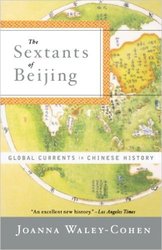One of my favorite China books is The Sextants of Beijing: Global Currents in Chinese History, by Joanna Waley-Cohen. In it she chronicles China’s historical interactions with the outside world, arguing that China has never been as isolationist as historians have suggested. What the West often perceived as isolationist policies or attitudes were instead China’s insistence that authority must never be surrendered to outsiders.
In 1792 Lord Macartney, representing the British king, arrived in China seeking to establish a trade relationship between the two countries. The emperor’s reply is one of the great rebuffs in history:
We have never valued ingenious articles, nor do we have the slightest need of your country’s manufactures.[1]
Seeking to provide context for that rebuff, Waley-Cohen writes:
Qianlong’s statement was of course directed at the king of England through his envoy Macartney. By extension it applied to other foreigners who might individually or collectively seek to alter the structure of China’s foreign relations to the disadvantage of ultimate Qing control. In this context we can better account for the emperor’s remarks when we realize that they conform to a pattern, according to which China has consistently sought to absorb Western practical technical skills while remaining inimical to Western ideologies. In the modern era, this disparity originated with the attempted exploitation by Christian missionaries of their scientific and technical expertise as a means of arousing Chinese interest in their religion. Many Chinese, although they fully grasped the utility of the practical knowledge, were hesitant to adopt it because it seemed inseparable from Christianity. As we have seen, they were accustomed to a political system in which ideology specifically either served orthodox authority or opposed it, and for that reason they sensed that the foreign religion was imbued with subversive potential.
The point is that the Chinese and their rulers have uniformly displayed a powerful reluctance to surrender authority or autonomy to any outsider or to even take a chance on doing so.[2]
What we see in this passage is that the tension in China between ideology and orthodox authority is nothing new; it’s not unique to Communist China. The state never has and will not allow competing ideologies to challenge its authority.
As we try to make sense of China’s policies towards religion in general, and the Christian church in particular, this is an important point to remember.

Joann Pittman
Joann Pittman is Vice President of Partnership and China Engagement and editor of ZGBriefs. Prior to joining ChinaSource, Joann spent 28 years working in China, as an English teacher, language student, program director, and cross-cultural trainer for organizations and businesses engaged in China. She has also taught Chinese at the University …View Full Bio
Are you enjoying a cup of good coffee or fragrant tea while reading the latest ChinaSource post? Consider donating the cost of that “cuppa” to support our content so we can continue to serve you with the latest on Christianity in China.
